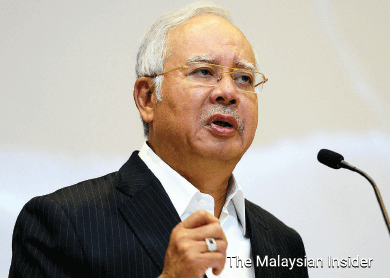
(July 14): Currently under investigation for the controversies surrounding 1Malaysia Development Berhad (1MDB), Prime Minister Datuk Seri Najib Razak has been hit with yet another corruption accusation, this time by the Australians involving contracts to print polymer bank notes.
The Sydney Morning Herald (SMH) reported that Canberra's requests for information from Putrajaya regarding improper dealings involving two Australian Reserve Bank firms over the contracts, have gone unheeded.
Quoting sources, the daily said senior officials in the Australian government are aware of intelligence that implicates people in the offices of both Najib and his predecessor Tun Abdullah Ahmad Badawi in the corruption case.
Malaysia, the report said, has paid no attention to the "formal mutual assistance" request from the Commonwealth Attorney-General's Department to provide information, which has been described as "sensitive", about the financial dealings of a group of middlemen.
The case has has triggered the prosecution of several Australian businessmen who worked for Securency and Note Printing Australia, SMH said.
It said that Malaysian officials were allegedly bribed by the two companies to win contracts to turn ringgit from paper notes to polymer between the late 1990s and 2009.
Some of the corrupt middlemen were apparently close to those in Najib and Abdullah's offices, the report added.
SMH said that Najib's representative dismissed the claims and has threatened legal action.
Besides that, Wikileaks has also been accused of publishing a suppression order by the Victoria's Supreme Court that had named Najib. The anti-secrecy group was reported to be under probe for the breach.
The order had prevented the publication of any information that "reveals, implies, suggests or alleges" that Najib ever "received or attempted to receive a bribe or improper payment" as well as the naming of Abdullah and other politicians from Indonesia and Vietnam, so as to not "unfairly" implicate the leaders and protect Australia's international relations and national security.
But earlier today, the Victoria Supreme Court quashed the gag order which Australia's Department of Foreign Affairs and Trade had obtained last year.
SMH reported that the court noted that although Najib and Abdullah were not the ones who were alleged to have received the bribes, the offices of both leaders have been implicated in the corrupt dealings.
PKR secretary-general Rafizi Ramli was reported as saying that the Malaysian public deserved to know why Najib or his representatives had met with officers from one of the companies here.
"These questions could not come at a more important time in Malaysia," he was quoted as saying, referring to the recent scandals that Najib has been been linked to in Malaysia.
Australia will be seen as being complicit with Najib to keep him in power if it went to great lengths to prevent the disclosure of the information, Rafizi was reported to have said.
It was previously reported that a former politician had, in November 2007, told the Reserve Bank of Australia that he had managed to convince the-then prime minister (Abdullah) to adopt the polymer bank note technology.
The bribery allegations first surfaced in 2009, which prompted the Australian Federal Police and Malaysian Anti-Corruption Commission (MACC) to begin separate probes.
In 2010, the MACC detained three individuals linked to the supply of RM5 polymer notes following a report that Securency had offered bribes to Malaysian officials.
All three, including a businessman, were charged with accepting RM11.3 million to secure the contract from Bank Negara Malaysia and to ensure that the government opted for the polymer notes.
Abdullah had in 2011 denied allegations that the two Australian firms attempted to bribe him for a RM100 million currency contract during his tenure.
This comes as Najib is being investigated after some US$700 million (RM2.67 billion) from state-owned funds ended up in his personal accounts, which have since been closed.
The prime minister has also come under fire over 1MDB's RM42 billion in debts, which the investment vehicle had amassed in a period of six years.
Last month, Australian daily The Age, in its expose of the overpriced purchase by Majlis Amanah Rakyat (Mara) of an apartment block in Melbourne, had reported that “a group of super-rich Malaysian officials” overpaid by A$4.75 million (RM13.8 million) for the property in 2013.
The trio had allegedly “overbid” for Dudley International House, from A$17.8 million to A$22.5 million (RM65.3 million), with the difference pocketed as bribes back home.
The property purchase was given a final nod by the Economic Council (EC). Najib is finance minister and chair of the EC. – The Malaysian Insider